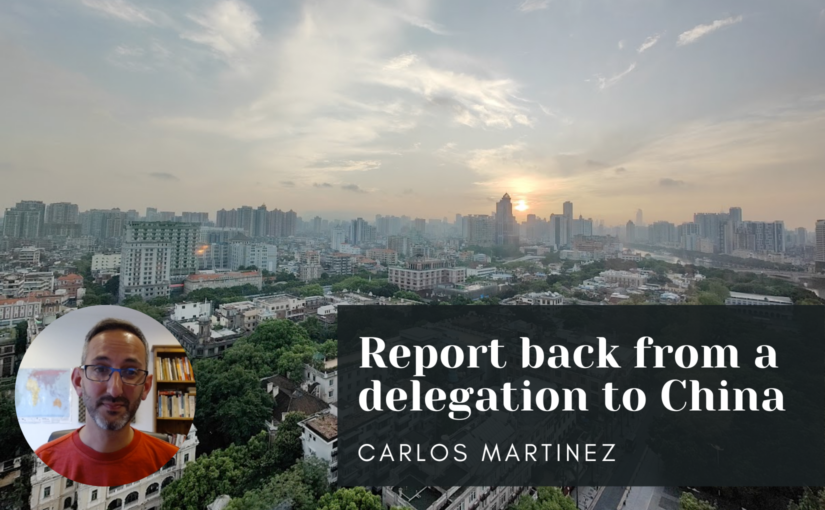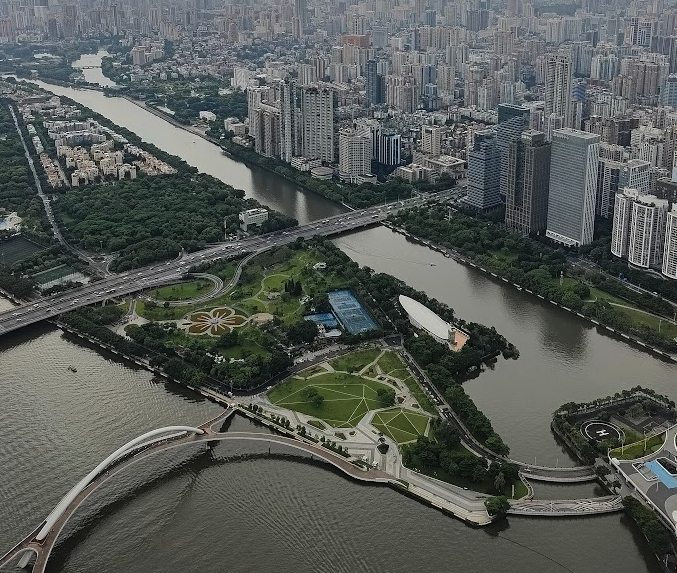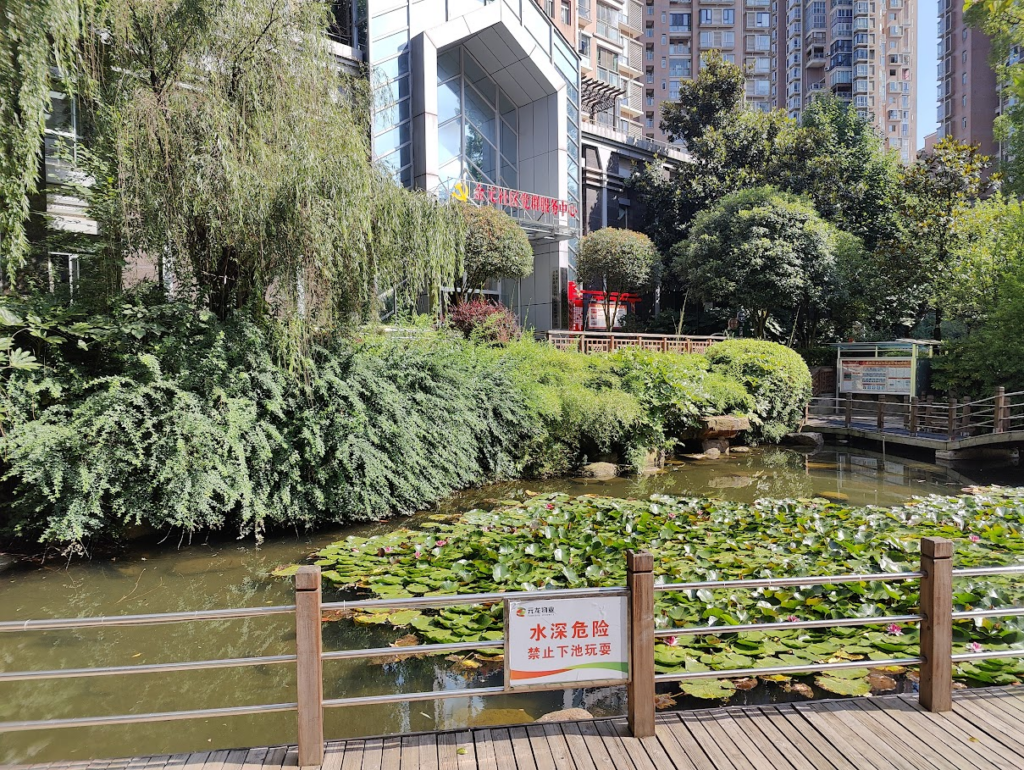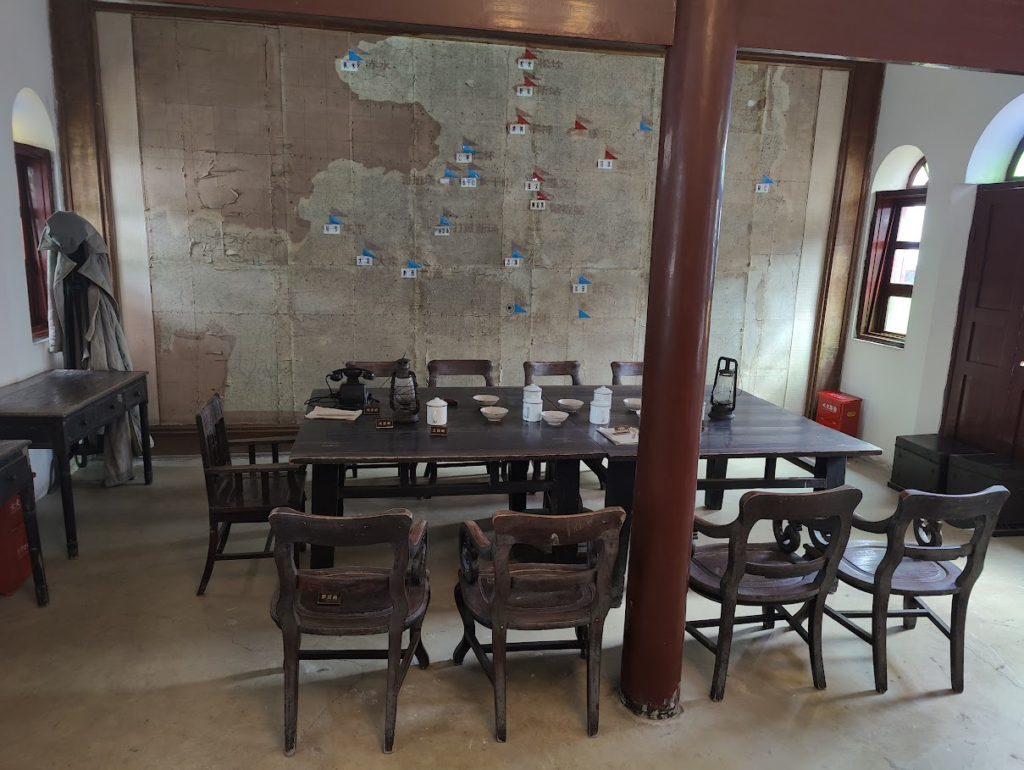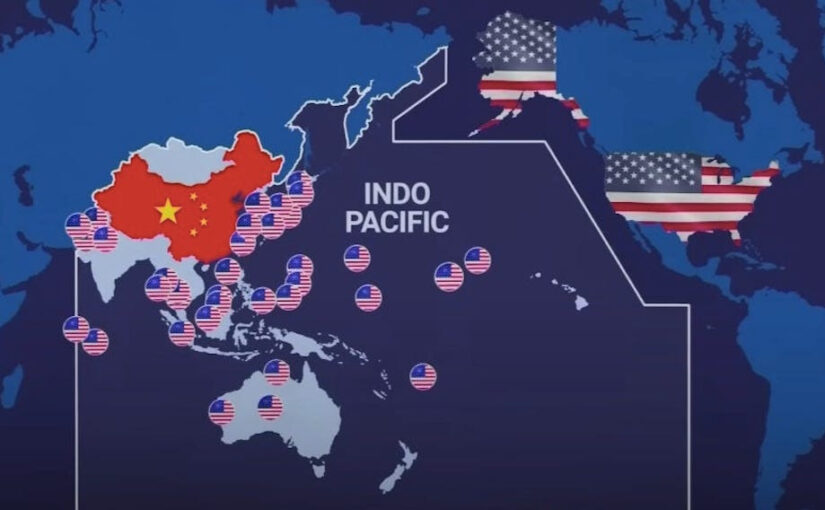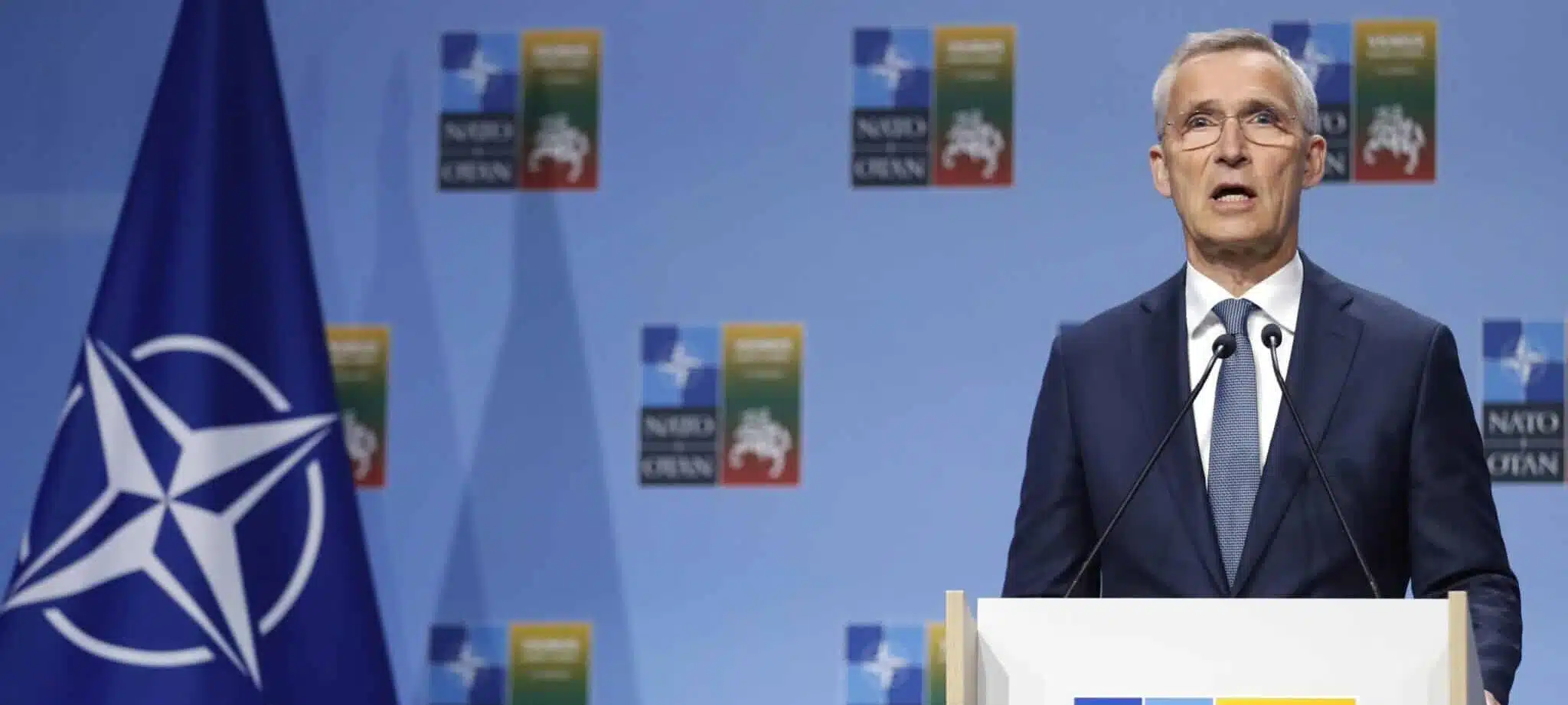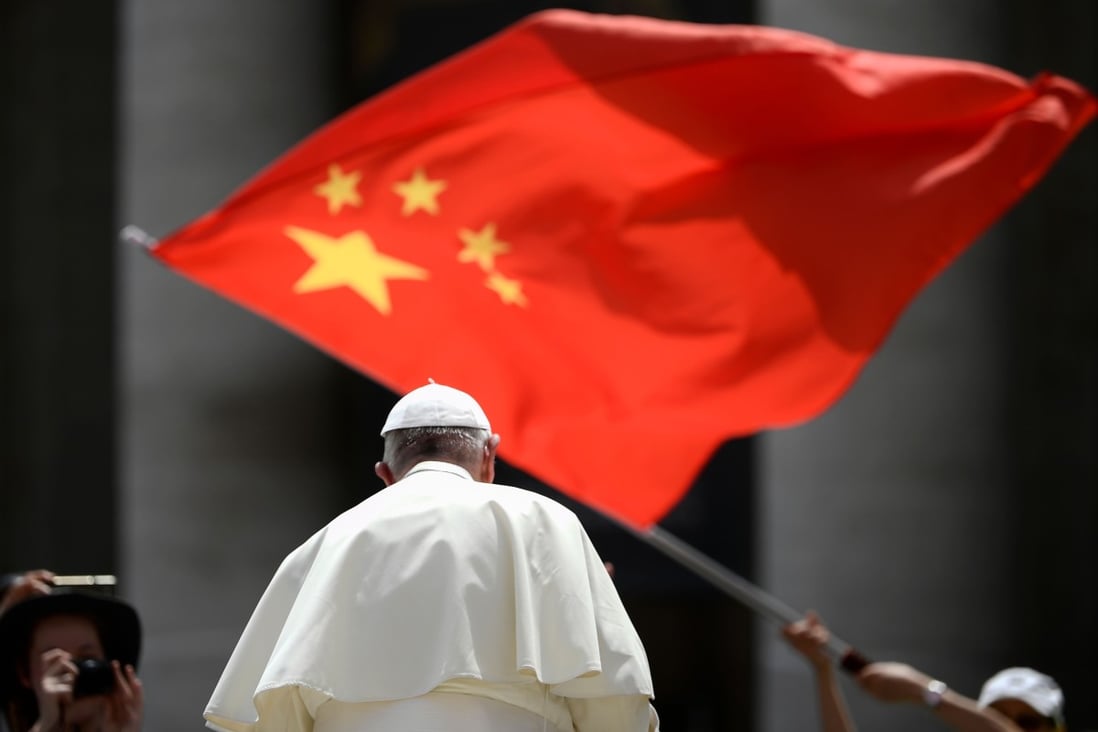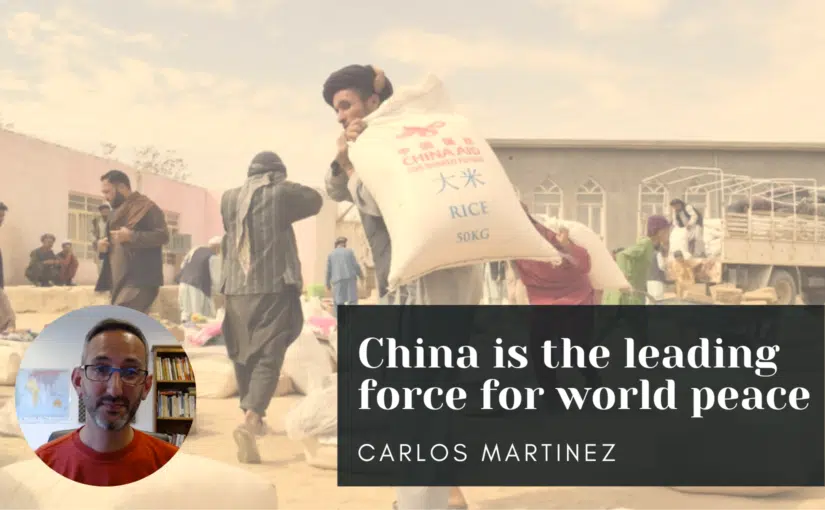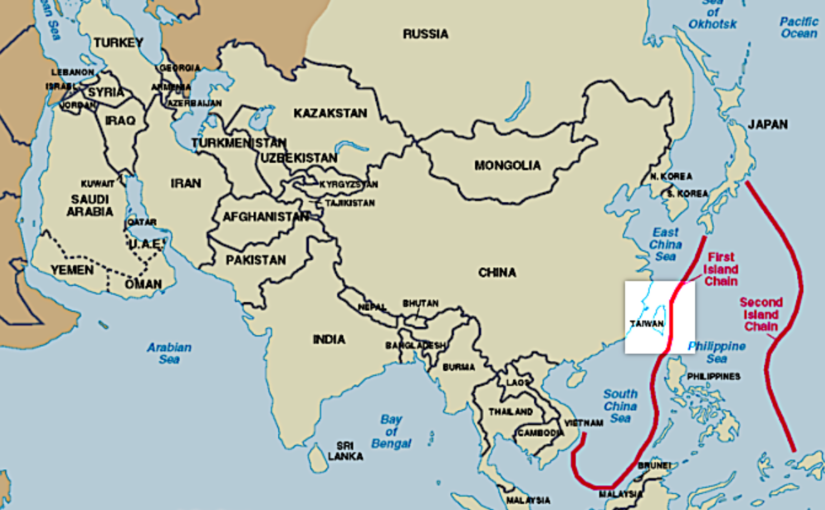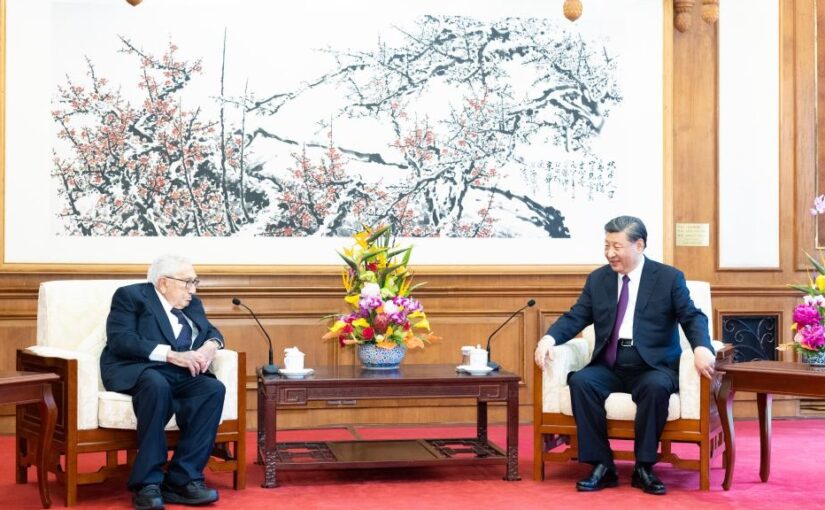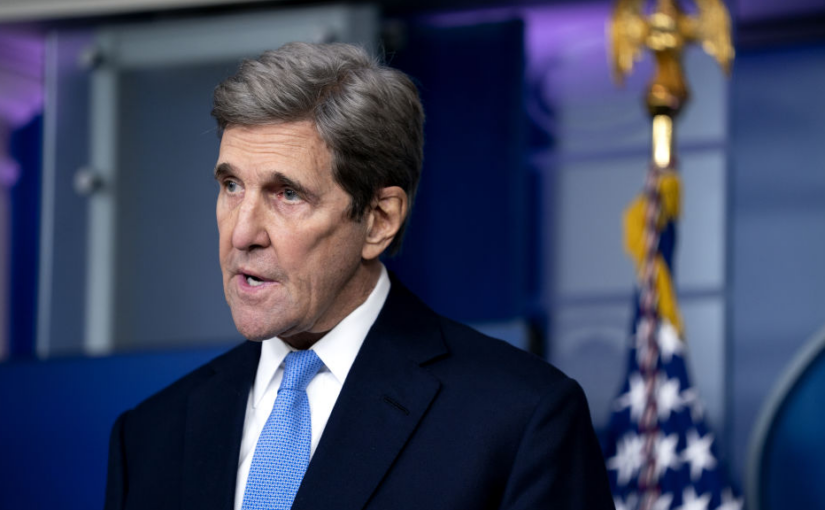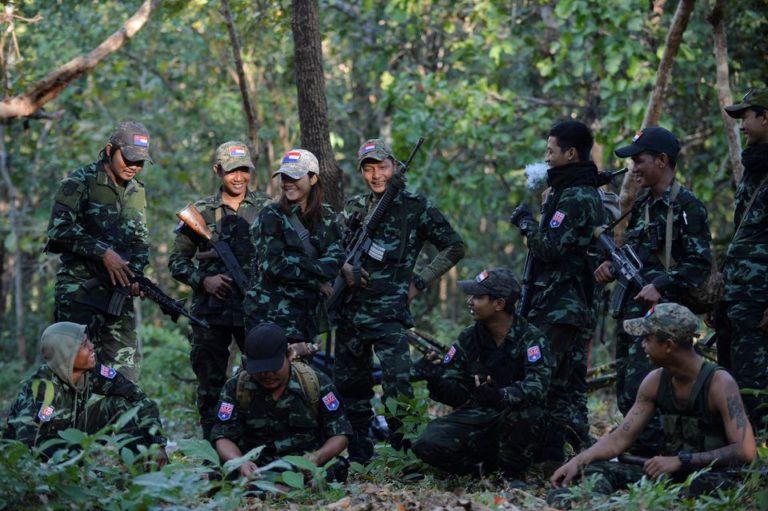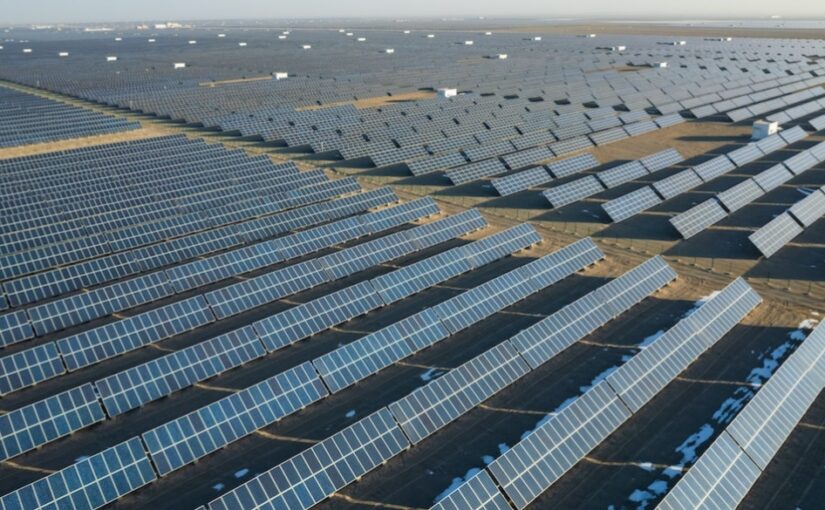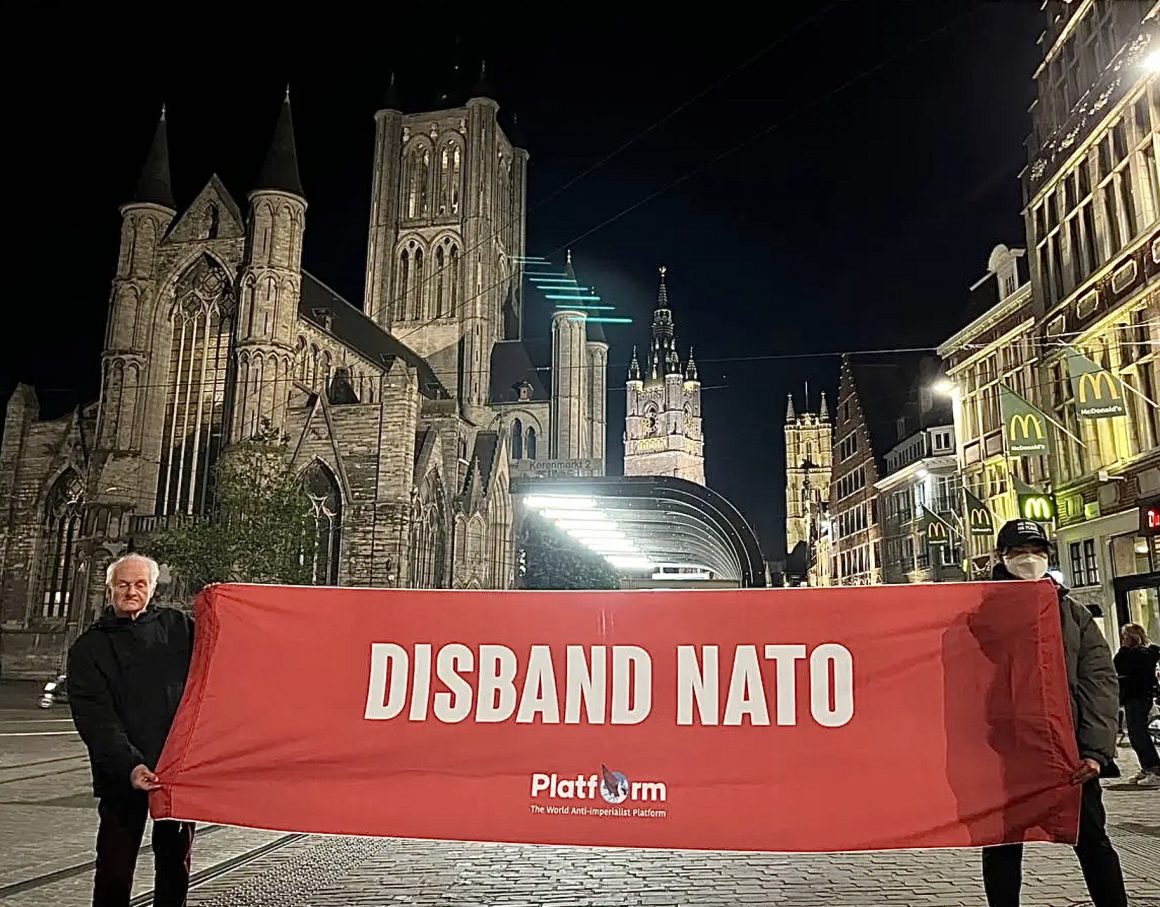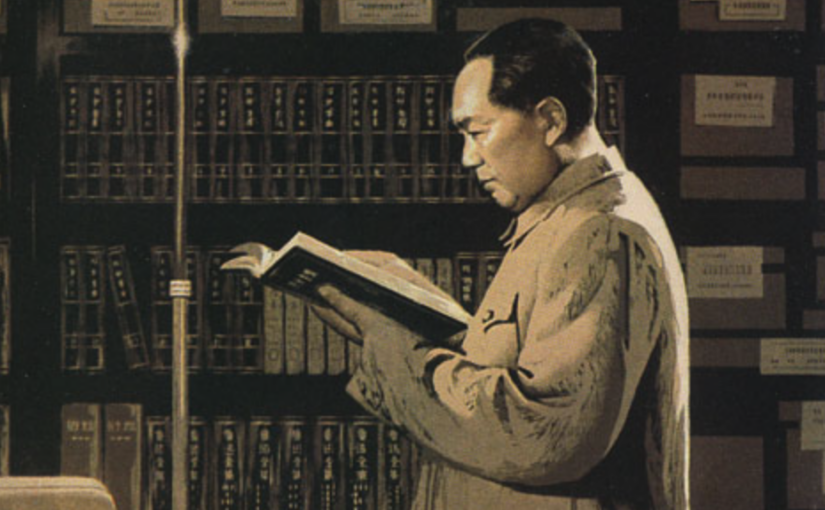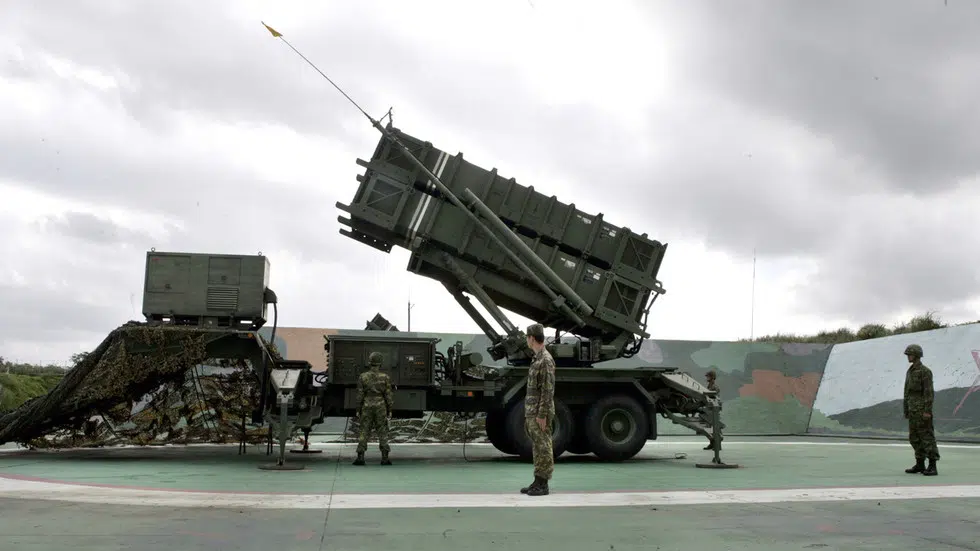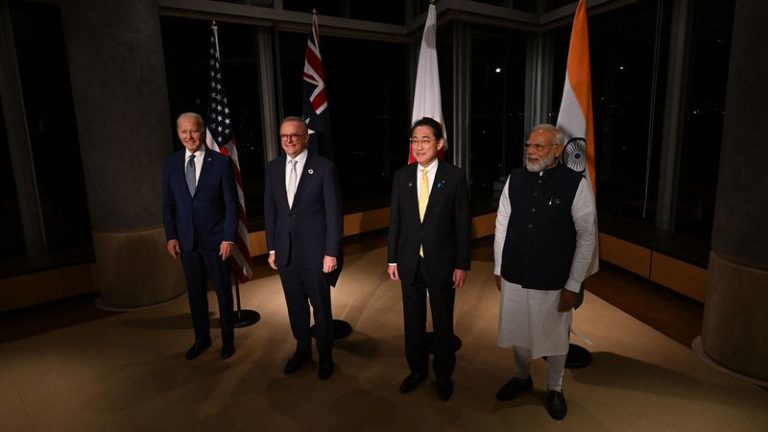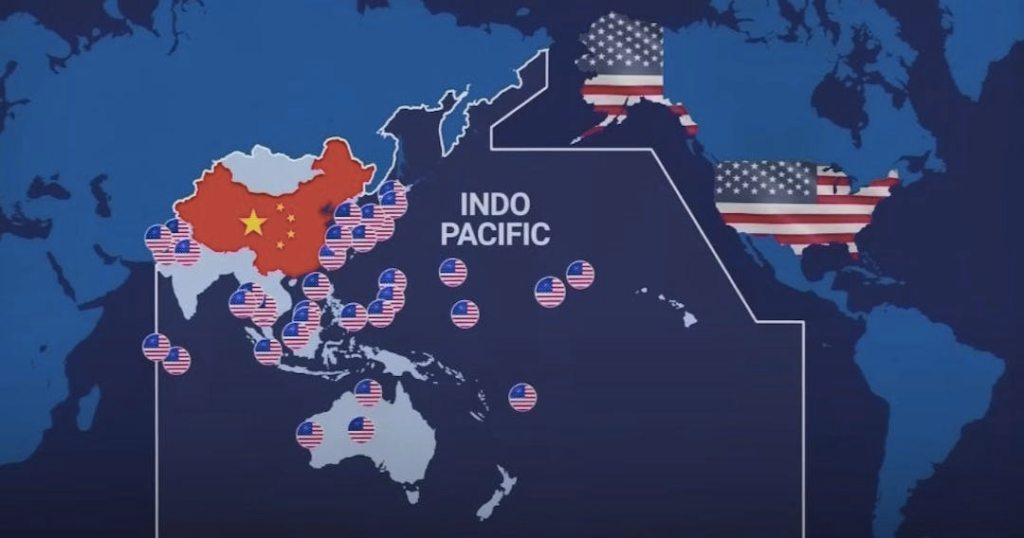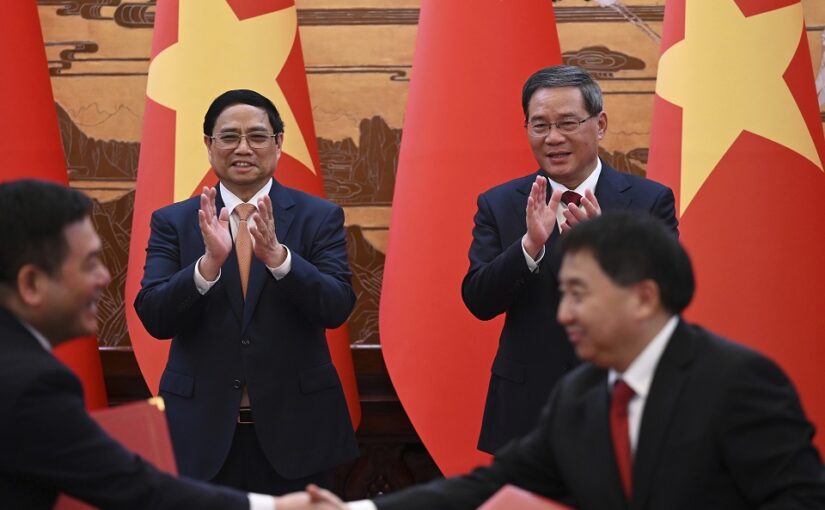By ZHANG YUNBI | CHINA DAILY | Updated: 2023-07-15 06:37
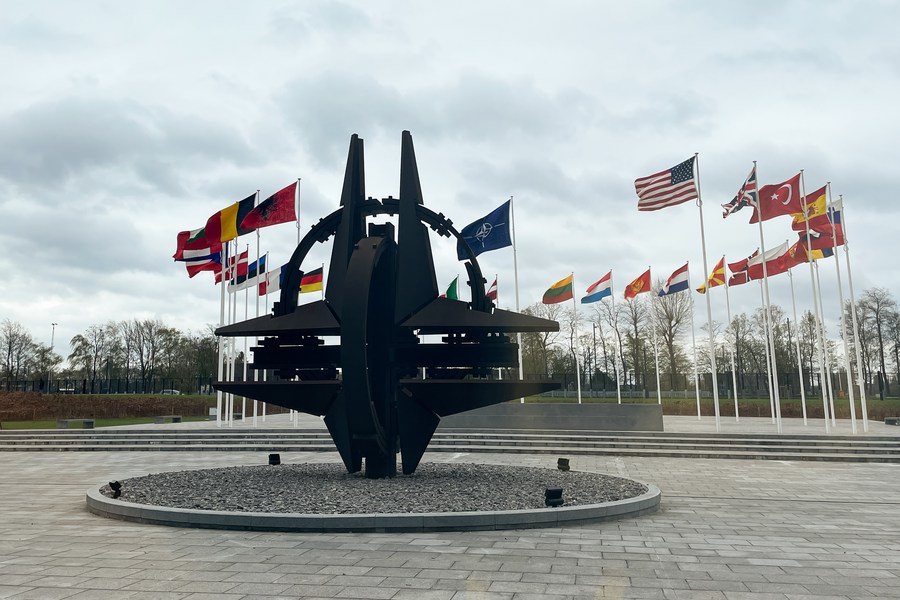
This photo taken on April 6, 2022 shows a sculpture and flags at NATO headquarters in Brussels, Belgium. [Photo/Xinhua]
Efforts urged for growth, stability in post-pandemic era at Jakarta gathering
Beijing on Friday criticized attempts to undermine the Association of Southeast Asian Nations' central role in the East Asian regional cooperation architecture, and dismissed NATO's ambition to meddle in the region.
Wang Yi, director of the Office of the Foreign Affairs Commission of the Communist Party of China Central Committee, made the stern warning in Jakarta when attending the annual East Asia Summit Foreign Ministers' Meeting.
The meeting in the Indonesian capital gathered representatives of 10 ASEAN countries along with eight other countries — Australia, China, Japan, India, New Zealand, the Republic of Korea, Russia and the United States.
Wang called on countries to "earnestly support the central role of ASEAN and build a solid foundation for peace".
Noting that ASEAN's central role is the natural result of evolution in history and the greatest common ground of all parties, Wang rejected attempts to undermine and replace ASEAN's role, and said "it is even more unreasonable for NATO to set foot in East Asia".
The region's peace "should not be based on the pursuit of absolute security by a small number of countries", and China is willing to explore cooperation with all parties regarding the Global Security Initiative it proposed, Wang said.
He reiterated China's willingness to take the lead in signing the Protocol to the Treaty on the Southeast Asia Nuclear Weapon-Free Zone.
Observers said the region has been overshadowed by the reinforced military presence of the US and its allies in the South China Sea, policies seeking economic "decoupling" and NATO's expanded outreach in the region.
Xu Liping, a veteran researcher on Southeast Asia studies at the National Institute of International Strategy of the Chinese Academy of Social Sciences, said, "We have seen deepening geopolitical competition among major countries, the lingering Ukraine crisis and the sluggish recovery of the world economy, as well as little relief in inflation, the energy crisis and food crises."
Currently, "ASEAN countries expect to work with all parties to seek regional peace and development and effectively promote cooperation in East Asia as a whole", he said.
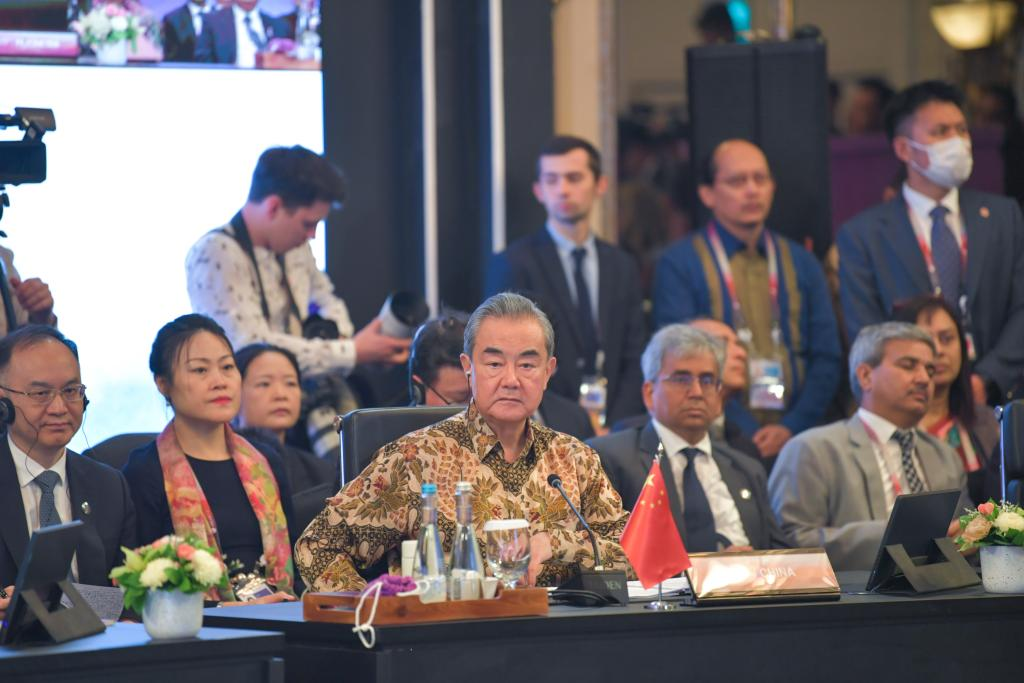
Director of the Office of the Central Commission for Foreign Affairs Wang Yi (Front) attends the 13th East Asia Summit Foreign Ministers' Meeting in Jakarta, Indonesia, on July 14, 2023. [Photo/Xinhua]
In Wang's speech, the senior diplomat asked nations to show their support for genuine multilateralism, strengthen benign interaction and put Asia-Pacific cooperation back on the right track.
He also called on all countries to join hands to make the region a center for economic growth, advance common development, champion the right path featuring economic globalization, and secure the multilateral trade system.
He added that China is ready to work with all parties to continue the advancement of cooperation in poverty relief and energy.
Liu Qing, vice-president of the China Institute of International Studies, said the meeting "mainly serves as a communication platform and plays a role in enhancing political mutual trust", and "ASEAN is an important engine of regional cooperation and development in Asia".
On the meeting's sidelines, Wang held bilateral talks with senior diplomats from countries including Japan, India and the ROK on Friday.
When meeting with Japanese Foreign Minister Yoshimasa Hayashi, Wang urged Tokyo to "shape an objective and rational perception of China, draw lessons from history with practical actions, and adhere to the path of peaceful development".
Recently, Tokyo has positioned China as its biggest "strategic challenge", exaggerating China's so-called "threat" on multiple occasions and in various documents. Wang said that this is "seriously inconsistent with the reality of China-Japan relations" and runs counter to the important consensus of the two sides that they "are cooperative partners, and do not pose a threat to one another".
He called on the Japanese side to "improve the feelings between the people of the two countries and promote China-Japan relations to return to the track of sound, stable development". Beijing is open to maintaining contacts at all levels, as well as economic and trade exchanges and people-to-people exchanges, he added.
Hayashi said Tokyo looks forward to building constructive and stable Japan-China relations and creating conditions for high-level exchanges.
On Friday, Wang also attended the ASEAN Regional Forum Foreign Ministers' Meeting.
http://global.chinadaily.com.cn/a/20230 ... 168e2.html
Envoy refutes NATO accusations
By MINLU ZHANG at the United Nations | China Daily Global | Updated: 2023-07-14 10:36
China's top envoy to the United Nations on Thursday refuted NATO's "unwarranted attacks and accusations" against China in a recent communique issued during the NATO Summit in Vilnius, Lithuania.
"The Cold War has long since ended, but the 'ghost' of the Cold War mentality has been hovering over the world," said Zhang Jun, China's permanent representative to the UN. He said the Cold War mentality "intensified global confrontation and conflicts".
Zhang made the remarks at a UN Security Council on Thursday in response to a communique released at the end of the NATO Summit on Tuesday, in which the military bloc mentioned China 15 times, saying that "China's stated ambitions and coercive policies challenge our interests, security and values" and that China posed "systemic challenges" to the alliance, Xinhua News reported.
"The communique issued at the meeting is filled with repeated and lengthy statements, rehashing old tunes, full of Cold War mentality and ideological bias. The communique ignores basic facts and makes unwarranted attacks and accusations against China. It is completely backward and hypocritical," said Zhang. "China strongly opposes it.
"NATO claims to be a regional organization, why then is NATO reaching beyond its geographical scope laid down in its treaty, making its foray into the Asia-Pacific, bringing more negative impacts and destructive factors to regional and global security?" Zhang asked.
"NATO claims to be a defensive alliance, why then is NATO encouraging member states to ramp up military budgets, keep crossing the line and expanding the mandate, and stoke confrontations," Zhang asked.
"NATO claims to defend a 'rules-based international order', but it has been ignoring international law and basic norms governing international relations and interfering in other countries' internal affairs," Zhang continued.
Zhang emphasized that NATO's accusations against China are groundless. "China is a force for world peace, a contributor to global development, and a defender of the international order," he said.
"China has the best record on peace and security. We have never invaded any country or engaged in any proxy war. We have never conducted global military operations, threatened other countries with force, exported ideology or interfered in other countries' internal affairs," Zhang said.
He said China follows a policy of 'no first use' of nuclear weapons at any time and has committed unconditionally to not using or threatening to use nuclear weapons against non-nuclear weapon states and nuclear-weapon-free zones. China is the only nuclear weapon state to have adopted such a policy.
"Would any NATO member states make such a commitment?" Zhang asked.
"We will resolutely fight back against any behavior that violates China's sovereignty and territorial integrity, damages China's security and development interests, and disrupts the peace and stability of China's surrounding areas," the envoy said.
At Thursday's Security Council meeting on non-proliferation of the Democratic People's Republic of Korea, Zhang also called for the denuclearization of the peninsula, the maintenance of peace and stability in the region, and the pursuit of a political settlement through dialogue.
The Korean Peninsula issue is a legacy of the Cold War that has cast a decades-long shadow, said Zhang. "It is essentially a political security issue, and the core lies in the lack of a peace mechanism."
The United States and other countries have long viewed the DPRK as a security threat and have been fixated on imposing sanctions and pressure, which has placed immense security threats and survival pressure on the DPRK, Zhang said, adding that "this approach will only intensify contradictions and heighten tension, and reality has already demonstrated".
"Dialogue and negotiation are the only correct and effective way to ease the tension on the peninsula and promote a political settlement," he said. "As long as the US and the DPRK resume dialogue and negotiations, the situation on the peninsula will remain stable, and there will be hope for a political settlement.
"Instead of accusing other countries of obstructing the Security Council's actions, the US should propose practical solutions, take meaningful actions, respond to the legitimate concerns of the DPRK, and implement the statement of 'unconditional dialogue' with actions," said Zhang.
He said the Security Council should also make active efforts to ease sanctions in due course, rather than "simply imposing sanctions and pressure", and it should not be "reduced to a tool for individual countries to achieve self-interest in geopolitics".
http://global.chinadaily.com.cn/a/20230 ... 166a6.html
China warns against military pressure on DPRK
Xinhua | Updated: 2023-07-14 19:42
UNITED NATIONS -- A Chinese envoy on Thursday warned against military pressure on the Democratic People's Republic of Korea (DPRK).
China's position on the Korean Peninsula question is very clear. China is committed to the denuclearization of the peninsula, maintaining peace and stability on the peninsula, and the political settlement of the issue through dialogue, said Zhang Jun, China's permanent representative to the United Nations.
"China has taken note of the DPRK's recent launch. Meanwhile, we are also concerned about the heightened military pressure and repeated dispatches of strategic weapons by a certain country to carry out military activities on the Korean Peninsula," Zhang told the Security Council.
None of the incidents have happened in isolation; should this vicious circle persist, the Korean Peninsula question will not only be intractable, but the situation will further escalate, he warned.
As a legacy of the Cold War, the Korean Peninsula issue persists to this very day. It is, in essence, a political and security issue, and its crux lies in the absence of a peace mechanism, said Zhang.
The United States and other countries have long regarded the DPRK as a security threat and are obsessed with sanctions and applying pressure on it, which has put the DPRK under an enormous security threat and existential pressure. Also, the DPRK's legitimate security concerns have never been addressed, he said.
In particular, since the beginning of this year, the United States and other countries have carried out joint military exercises on the peninsula on an unprecedented large scale, featuring highly targeted and provocative drills. The Washington Declaration, which upgrades "extended deterrence," was issued. Such an approach will only intensify confrontation and tensions, as demonstrated by the current events, said Zhang.
The history of the progression of the Korean Peninsula issue since the 1990s clearly shows that dialogue and negotiation are the only correct and effective way to ease tensions on the peninsula and promote a political settlement. As long as the United States and the DPRK resume dialogue and negotiations and meet each other halfway, the situation on the peninsula will remain stable and there is hope for a political settlement, he said.
The United States, rather than accusing others of preventing Security Council action, should come up with practical plans and take meaningful steps to respond to the DPRK's legitimate concerns and translate its posture of "unconditional dialogue" into action, he said.
The point of departure for the Security Council's handling of the Korean Peninsula issue should be to defuse the situation and promote long-term peace and stability, rather than simply imposing sanctions and exerting pressure, still less should it become a tool for certain countries to achieve their own geopolitical interests, he said.
Promoting political solutions and strengthening solidarity and mutual trust are the keys to maintaining the prestige and the authority of the Security Council. All parties should implement the DPRK-related council resolutions in a comprehensive manner. The provisions relating to the resumption of dialogue and political settlement, in particular, should not be selectively ignored, he said.
The starting point of the DPRK-related draft resolution jointly sponsored by China and Russia is to send a positive signal of goodwill, create conditions for the resumption of dialogue and a turnaround of the situation and promote the political settlement of the Korean Peninsula issue. Those council members that demand Security Council action should seriously consider this draft resolution, said Zhang.
http://global.chinadaily.com.cn/a/20230 ... 16877.html
******
NATO'S BLOOD DEBT TO CHINA: THE BOMBING OF THE EMBASSY IN YUGOSLAVIA
Jul 14, 2023 , 12:54 p.m.

People walk past the Serbian government building, heavily damaged by shelling in Belgrade on May 11, 1999 (Photo: AP)
The North Atlantic Treaty Organization (NATO) Summit, held on July 11-12 in Vilnius, the capital of Lithuania, had China as a systemic challenge to the "rules-based international order" as its central theme. so its members agreed to cooperate to protect themselves from the "coercive behavior" of the Asian country.
In response to the organization's actions, the spokesperson for the Chinese Foreign Ministry referred to a historical fact in which NATO is precisely the one that represents a danger. Diplomatic official Hua Chunying recalled the bombing of the Chinese embassy by the Atlanticist corps in Yugoslavia in May 1999.
Likewise, he denounced the "war machine" of the Atlantic Alliance that could lead to "the confrontation between blocks or a new Cold War."
It would be necessary to ask what criminal acts can be foisted on China so that it is considered a threat by the bloc led by the United States. Instead, NATO has a history of war crimes that have gone unpunished.
On May 7, 1999, the Chinese embassy in Belgrade was bombed during a NATO-organized airstrike. The five bombs that fell killed three Chinese journalists, injured more than 20 diplomats and severely damaged the facility.
"Although 24 years have passed, I cannot forget each and every scene of that tragic night. Today we gather here to see the recently completed Chinese Cultural Center, but every time I come here what my eyes see is still the bombardment of the Chinese embassy that night. The brutal and instantaneous loss of the lives of colleagues, something I will never be able or dare to forget in my entire life," Chen Bo, Chinese ambassador to Serbia, said at a commemoration event earlier this year .
https://misionverdad.com/la-deuda-de-sa ... yugoslavia
Google Translator
********
China to Push Back Against NATO Aggression in Asia-Pacific
Posted by INTERNATIONALIST 360° on JULY 14, 2023
Drago Bosnic
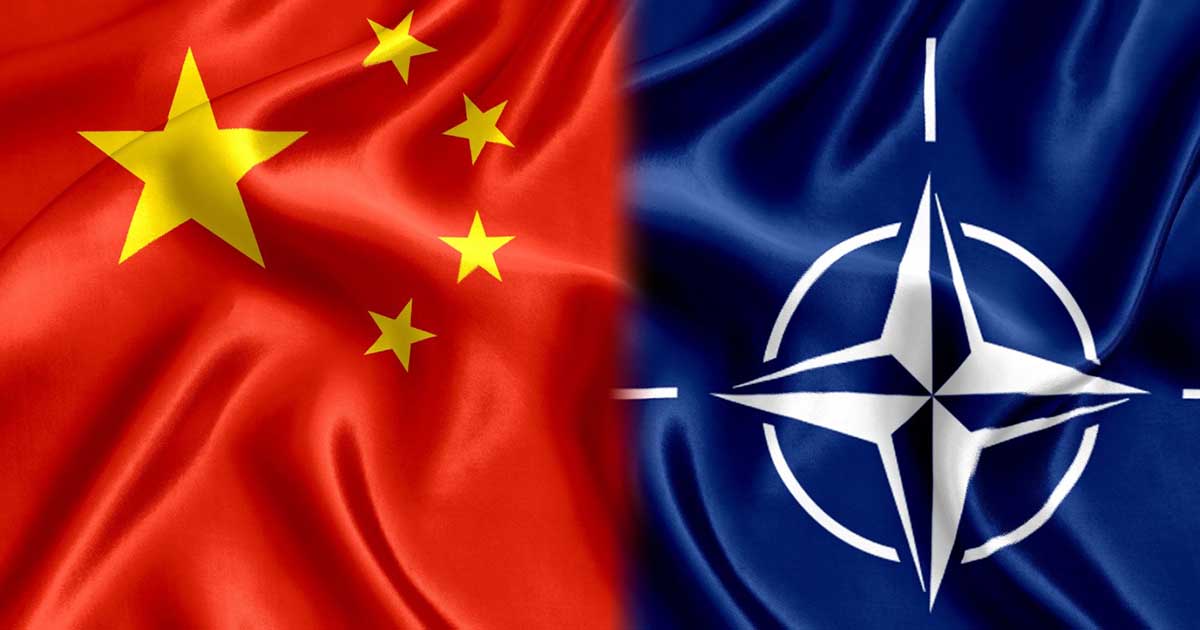
Despite all the failures of its favorite puppet regime, as well as the inability to hide or spin this for propaganda purposes, NATO seems to be expanding its comprehensive aggression against the world. This time, its target is the Asia-Pacific region, particularly its foremost power – China. The United States aims to use the belligerent alliance to expand its military footprint and infrastructure to the relatively stable region (or at least it was until Washington DC moved in). The thalassocratic bloc’s presence in the area will surely result in an exponential increase in tensions with China, as the Asian giant simply cannot tolerate NATO’s deeply destabilizing military presence.
Given the belligerent alliance’s history of aggressions and invasions all over the world, Beijing is rightfully alarmed and irritated by signals it has observed at this year’s NATO summit in Lithuania’s Vilnius, particularly regarding its announced expansionism in the Asia-Pacific. On July 12, the closing day of the summit, Beijing vowed a resolute response to this unadulterated aggression. China’s mission to the European Union issued a strong statement after NATO publicly announced its plans the previous day. The reason Beijing is relaying its message through the EU is that the troubled bloc has effectively faded into strategic irrelevance by becoming a geopolitical pendant of the US and NATO.
“The China-related content of the communique disregards basic facts, wantonly distorts China’s position and policies, and deliberately discredits China. We firmly oppose and reject this,” China’s diplomatic mission stated, further emphasizing that it “strongly opposes NATO’s eastward movement into the Asia-Pacific region” and warning: “Any act that jeopardizes China’s legitimate rights and interests will be met with a resolute response.”
And while some might say the wording is “too strong”, it’s still quite reserved and diplomatic given the actually threatening rhetoric coming from NATO. The belligerent alliance has effectively accused Beijing of supposed “meddling” and “attacks”, particularly cyber warfare.
“The PRC employs a broad range of political, economic, and military tools to increase its global footprint and project power, while remaining opaque about its strategy, intentions and military build-up,” the controversial NATO communique stated, adding: “The PRC’s malicious hybrid and cyber operations and its confrontational rhetoric and disinformation target Allies and harm Alliance security.”
Such rhetoric can only be described as a declaration of yet another “cold war” by NATO, as the belligerent alliance has officially returned to such policies in regard to Russia during its summit in Madrid last year. Strangely enough, the belligerent alliance also accused China of supposed “economic aggression” and alleged “attempts to expand its influence” around the world through the use of “economic tools”. And yet, such accusations make little sense, as Beijing doesn’t force anyone to do business with it. On the contrary, the virtually unrivaled competitiveness of China’s economy makes it a priority partner for the vast majority of countries in the world.
The presence of the top political establishment of four US Asia-Pacific vassals and satellite states, namely Australia’s and New Zealand’s Prime Ministers Anthony Albanese and Chris Hipkins, as well as Japanese Prime Minister Fumio Kishida and South Korean President Yoon Suk Yeol, makes NATO’s threats all the more serious. Thus, Beijing can only assume the aforementioned expansionism is much more than simple rhetoric aimed at earning cheap geopolitical points. This is particularly true for Kishida, who has been publicly talking about “Japan’s future in NATO” at least since May, as Tokyo is indeed expanding its coordination with the belligerent alliance’s operations in the region.
And while the plan to open NATO’s liaison office in Tokyo has reportedly been shelved, allegedly due to French opposition, the proposed “deepening of ties” is rightfully seen as a direct threat in China. Expecting such hostility from the political West, Beijing has already made sure its reasoning is heard through export restrictions on rare-earth elements, a move that has sent shockwaves across Western markets, as the price of these prized commodities has soared as a result. In other words, while China avoids using its economic might for geopolitical purposes, it has demonstrated to NATO what it’s like when the Asian giant actually does what the belligerent alliance has previously accused it of doing.
The likely response to US aggression in the Asia-Pacific will be China’s own increased coordination with Russia, as Moscow is in possession of massive strategic capabilities in the region. These assets can provide invaluable assistance to Beijing, particularly Russia’s strategic bombers/missile carriers and nuclear-powered ballistic (SSBNs) and guided missile submarines (SSGNs). Moscow itself maintains such capabilities to deter US forces in the Pacific, as well as ensure retaliation in case Washington DC tries to escalate the ongoing (New) Cold War into a hot one. With that in mind, it’s unclear why most US vassals and satellite states are still compliant with such a suicidal strategic approach.
https://libya360.wordpress.com/2023/07/ ... a-pacific/
********
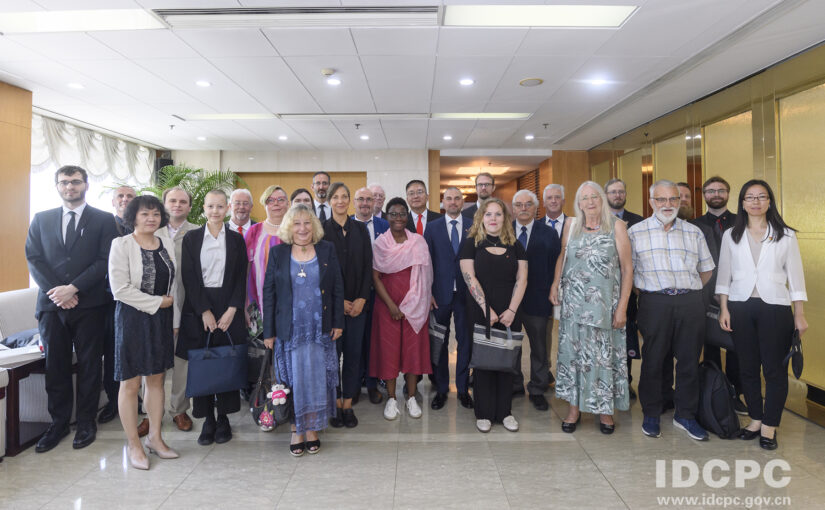
Guo Yezhou meets with Communist Party leaders delegation
Guo Yezhou, Vice-minister of the International Department of the CPC Central Committee (IDCPC), met here today with the 3rd Communist Party Leaders Delegation of North American, Oceanian and Nordic Countries led by Robert Griffiths, General Secretary of the Communist Party of Britain.The Third Communist Party Leaders Delegation of North American, Oceanian and Nordic Countries visited China from June 24-July 4 at the invitation of the International Department of the Central Committee of the Communist Party of China (IDCPC).
Friends of Socialist China were invited to join this delegation, and our delegates were co-editors Keith Bennett and Carlos Martinez and advisory group member Francisco Domínguez. The delegation was led by Robert Griffiths, General Secretary of the Communist Party of Britain (CPB). The other parties represented were:
Communist Party of Australia
Communist Party of Ireland
Communist Party of Finland
Communist Party (Sweden)
Communist Party of Norway
Communist Party USA
Communist Party of Canada (including Le Parti communiste du Québec)
Communist Party of Denmark
New Communist Party of Britain
Communist Party of Great Britain (Marxist-Leninist)
The delegation enjoyed a rich and varied programme in Guangzhou, Guiyang, Zunyi and Beijing. On June 30, it met with IDCPC Vice Minister Guo Yezhou in Beijng, who expressed the CPC’s willingness to deepen exchanges and cooperation and jointly open up a better future for humanity, together with all the parties represented. The below report of the meeting with Comrade Guo was originally published on the IDCPC website.
Friends of Socialist China once again expresses its warmest thanks and appreciation to our comrades in the IDCPC for their kind invitation and wonderful arrangements. We will be carrying further reports on the visit.
Guo said, at present, the central task of the CPC is uniting and leading the people of all ethnic groups of China to build a modern socialist country in an all-round way, achieve the second centenary goal, and advance rejuvenation of the Chinese nation on all fronts through a Chinese path to modernization. On the new journey, we are willing to, together with Marxist political parties in North American, Oceanian and Nordic Countries, deepen exchanges and cooperation, and jointly open up a better future for mankind.
Griffiths said he was very happy to visit China at the invitation of the IDCPC. During the visit, he further deepened understanding of the CPC, and witnessed China’s new development and progress. He said, the CPC made outstanding contributions to world peace, security, development, and prosperity. The Marxist political parties in North American, Oceanian and Nordic Countries are willing to strengthen exchanges with the CPC to jointly safeguard world peace and stability.
https://socialistchina.org/2023/07/12/g ... elegation/
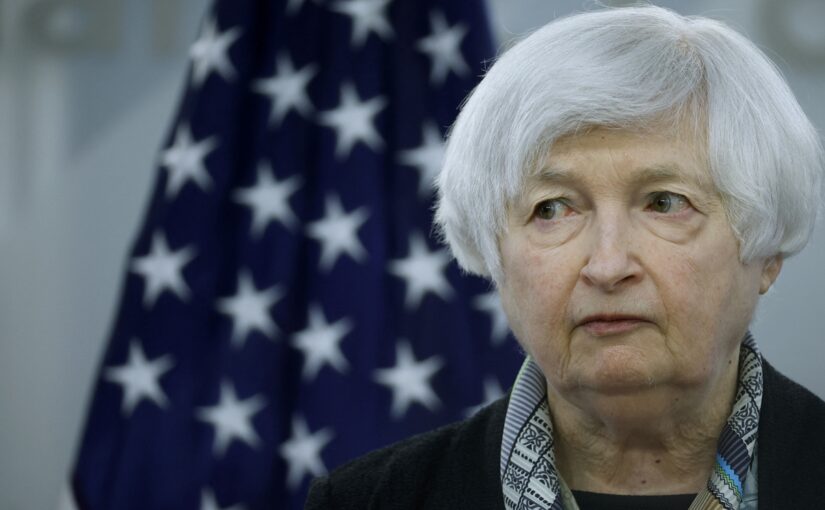
Renewable energy development is less important than stopping Chinese industry!
Janet Yellen went to China and warned them there would be consequences if they didn’t adopt a market economy. There’s so many admissions in this little statement that shouldn’t go unnoticed. If the market system is the best and most efficient, as its proponents claim, why would Yellen complain about China using state subsidies or protections and interfering in it? Wouldn’t that just allow the US to use the market to win the game? If the market is the “cheat code”, as the gamers say, then how could China “cheat” by using non-market mechanisms? The flip side of the coin is also there. If the US, as its officials repeatedly cry, is desperate to stop the rise of China, why would they advise China to take steps (like market reforms) that should, according to market theory, only accelerate China’s rise? Perhaps it is because Yellen knows market reforms would actually destroy the basis of China’s growth and ensure its subordination to the US.In this brief but incisive blog post, Canadian anti-imperialist writer Justin Podur unpacks the contradictory remarks made by US Treasury Secretary Janet Yellen during her visit to Beijing, complaining about China’s use of state subsidies in certain parts of its economy. As Justin points out, “if the market system is the best and most efficient, why would Yellen complain about China using state subsidies or protections and interfering in it? Wouldn’t that just allow the US to use the market to win the game?” And why would they want China to adopt measures that would – according to free-market fundamentalism – accelerate its rise?
The reality is that the US wants Beijing to adopt an economic strategy that “would actually destroy the basis of China’s growth and ensure its subordination to the US.” One side-effect of this is that it would cause a major disruption to the solar energy industry, in which China is dominant (Justin notes that China holds 80 percent of photovoltaic patents worldwide). As such, “the imperialist anxiety to stop the rise of Chinese industry conflicts with the green priority for a transition to renewables.” But in this battle of priorities between hegemonism and the environment, the US is siding with hegemonism. An important reminder that the struggle against the New Cold War is also a struggle to keep the planet habitable.
I want to talk about one of these Chinese industries that has grown up under state subsidy and protection that is – again according to Western environmentalists – very important in the struggle against climate change: photovoltaics (solar panels) and other renewable energy technologies.
There’s this video from a youtube channel called Tech Teller that outlines some details about the rise of China’s PV industry. The news hook for the video was the arrest of a Chinese PV executive, Pu Yonghua of Jiangsu Green Power New Energy, in Germany. It looked like Germany was going to pull a Canada (with the kidnapping of Meng Wanzhou of Huawei) and get into a pointless years-long conflict at US urging. But it looks like Pu Yonghua was released a few days later.
Tech teller’s video provides some “startling figures” about China’s dominance in PV:
of 150,000 PV patents worldwide, Chinese companies hold 120,000 of them.
The top ten PV companies in the world are all Chinese.
Chinese PV has a market share of 60% in the US and peaked at 95% in the EU. EU’s domestic PV capacity accounted for 3% of market share there.
200 countries are customers of Chinese PV products.
The EU’s attempt to raise its renewable energy use to reduce its dependence on Russian gas is ultimately a plan to transfer its dependence on Russia — to China.
China’s PV industry is so far ahead that the US and EU industries are going to have a lot of difficulty catching up. This despite, as the video tells, depraved and repeated attempts to stop China from developing by both the US and EU.
There are problems with PV, as environmentalists like Stan Cox have noted, including the mining footprint of rare earths and the use of fossil fuels in their production. But there is a Green consensus on the need to get off of fossil fuels and PV technology will be key to get there. The imperialist anxiety to stop the rise of Chinese industry conflicts with Green the green priority for a transition to renewables. It is another case of Western imperialism vs the environment. If you believe climate change is an existential issue for the species like nuclear war, you could use Chomsky’s phrase and consider it a choice between Hegemony or Survival.
Which do you think the US will choose?
https://socialistchina.org/2023/07/09/r ... -industry/
******
JULY 18, 2023 BY M. K. BHADRAKUMAR
Politics of hedging in the Indo-Pacific
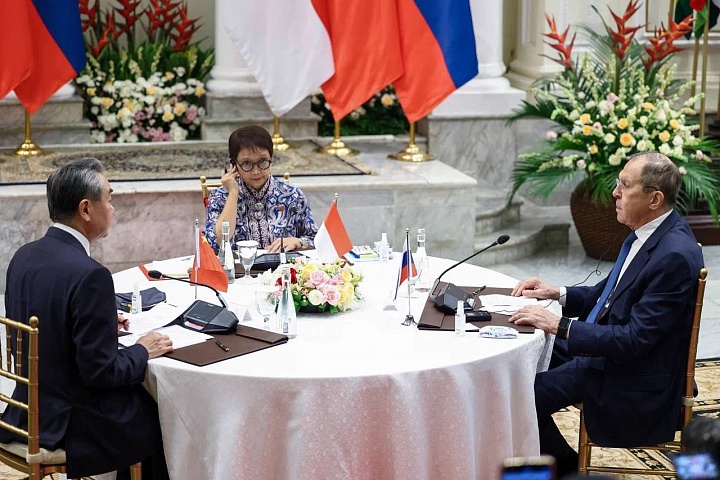
Indonesia’s Foreign Minister Retno Marsudi (C) with Director of Foreign Affairs Commission of Communist Party of China Central Committee Wang Yi (L) and Russia’s Foreign Minister Sergey Lavrov (R) at trilateral meeting, Jakarta, July 12, 2023
On Monday, while delivering the keynote address at the annual China Business Summit held in Auckland, New Zealand Prime Minister Chris Hipkins weighed in on the power dynamic in the Indo-Pacific.
New Zealand’s estimation matters because it is a small country in Southern Pacific heavily dependent on trade with China for preserving its prosperity and yet one of the Five Eyes (along with the US, UK, Australia and Canada), the exclusive secretive security grouping of Anglo-Saxon countries.
Hipkins’ speech came just three weeks after his return from Beijing on an official visit with a business delegation when he met with China’s President Xi Jinping. Meanwhile, Hipkins had just returned from the NATO Summit in Vilnius last week. NewZealand PMs have begun attending the NATO summits since last year as one of “IP4,” the alliance’s four Indo-Pacific partners (joining Australia, Japan and South Korea.)
The Chinese readout of President Xi’s meeting with Hipkins in Beijing on June 27 attributed the following remarks to the latter: “He [Hipkins] said that New Zealand values its relations with China… (and) believes that bilateral relations should not be defined by differences, and it is important that the two sides have candid communication, mutual respect, and harmony without uniformity. New Zealand is willing and ready to maintain communication with China on helping island countries develop.”
But at Auckland on Monday, he added caveats: “China’s rise and how it seeks to exert that influence is also a major driver of the increasing strategic competition, particularly in our wider home region, the Indo-Pacific. Our region is becoming more contested, less predictable, and less secure. And that poses challenges for small countries like New Zealand that are reliant on the stability and predictability of international rules for our prosperity and security.” (See today’s China Daily report titled New Zealand PM calls for deepening economic, environmental cooperation with China.)
What emerges is that the traditional security concepts of balancing and bandwagoning are insufficient for understanding how smaller states like New Zealand are responding to US–China rivalry. (See the USIP commentary New Zealand Draws Closer to NATO with a Wary Eye.)
This was also the leitmotif of the foreign and security policy choices exhibited by Southeast Asian countries at the ASEAN summit and related events in Jakarta in the weekend. The US Secretary of State Antony Blinken’s single-minded mission at Jakarta was to rally ASEAN members to the US banner. But ASEAN countries are choosing their own path, which is not to choose sides between the US and China.
Even Singapore, the US’s closest ally in southeast Asia, has begun to differ. Foreign Minister Vivian Balakrishnan told reporters ahead of the ASEAN Regional Forum in Jakarta on Friday that the ASEAN countries do not want to be divided or vassal states, “or worse, an arena for proxy wars.”
The US underestimates the strength and resilience of the cooperative relations that have been forged between ASEAN countries and China. Simply put, the diplomatic and political engagement between China and the ASEAN in Jakarta last week showed that there is a shared will to not let differences and disputes disrupt national or regional development. The trade volume between ASEAN and China touched $431.3 billion in the first half of this year, according to latest official data, an increase of 5.4 percent compared with the same period last year.
The meetings in Jakarta on Friday indicated that the ASEAN countries do not want the US to make the region another arena for its destructive power games. The completion of the second reading of the text for a Code of Conduct in the South China Sea, and the adoption of a guideline document for its early conclusion, sent out a clear signal that the ASEAN region will not allow any seeds of discord to take root. Of course, this momentum serves China’s interests while it undercuts the US attempts to create friction in ASEAN’s relations with China.
Indonesian President Joko Widodo told regional foreign ministers who gathered in Jakarta on Friday that ASEAN should not become a proxy to any power. Interestingly, alluding to the western attempts to split the ASEAN, Widodo underscored to the regional foreign ministers who were paying him a courtesy call on him (who included the QUAD foreign ministers) that the ASEAN is committed to strengthening its unity, solidarity and centrality in maintaining peace and stability in the region. “ASEAN cannot be a competition, it can’t be a proxy of any country, and international law should be respected consistently,” he said.
In effect, the 18-nation East Asia Summit which was held during the ASEAN Summit, witnessed for the first time the concept of neutrality combining with the concept of ASEAN centrality and the ASEAN Outlook on the Indo-Pacific.
Significantly, last Wednesday, ahead of the ASEAN summit, the foreign minister of Indonesia Retno Marsudi held a trilateral meeting with the Chinese CCP Central Committee’s foreign policy chief and Politburo member Wang Yi and her Russian counterpart Sergey Lavrov in Jakarta. The Chinese and Russian readouts (here and here) show a high level of satisfaction that the ASEAN is getting its act together, which strengthens the shift to a multipolar world order. To be sure, a key item for discussion would have been Indonesia’s BRICS membership.
Indonesia will be a strategic asset for BRICS. Historically, hedging as a concept arose out of the dialectics of the traditional security concepts of balancing and bandwagoning. But Indonesia is creatively taking matters to a “post-hedging” security paradigm where states big and small are shifting to economic policy as the meaningful indicator of security alignment. Simply put, the Southeast Asian states want a stable geopolitical environment to focus on their economic development and do not want to be forced to “take sides” in any hegemonic rivalry.
However, this transition won’t be smooth. The US is weaponising economic and technological connectivity making it a source of geopolitical power and vulnerability. If weaponised interdependence means that more economic and technological policies are perceived as zero-sum, the policy space for hedging shrinks, in principle.
But then, a government might choose Chinese telecommunications providers purely based on cost, speed of rollout and superior quality, and disregard the West’s paranoia about network security risks. This is already happening in the Gulf region. The smaller nations’ motivation cannot be underestimated.
Besides, China has had a head start. The launch of RCEP and evolving investment flows look set to further strengthen the strong economic links between ASEAN and China. The ASEAN-China trade corridor stretching from the cold and dry steppes in northern China to the tropical jungles of Indonesia generates a diverse range of commercial activity, with each geography equipped with its own competitive advantage.
Thus, China’s Pearl River Delta, Thailand and Vietnam, for example, are all important manufacturing hubs, while Indonesia and Malaysia are rich in natural resources. Hong Kong and Singapore are international financial centres, and Shenzhen is shaping up to be Asia’s Silicon Valley.
The potential economic impact will be huge. ASEAN trade to China is moving up the value chain. Looking to the future, green development and promoting innovation will be key areas of strategic focus. And these ambitions will be realised by investment. Equally, as the Chinese economy undergoes a tech-driven transformation, its homegrown innovations will be exported to other countries. ASEAN is a prime candidate.
Chinese companies are already building data centres and 5G networks across the ASEAN region. The Chinese ambassador to the ASEAN Hou Yanqi recently called the China-ASEAN common space the “epicentrum of growth” in the world economy.
https://www.indianpunchline.com/politic ... o-pacific/
******
